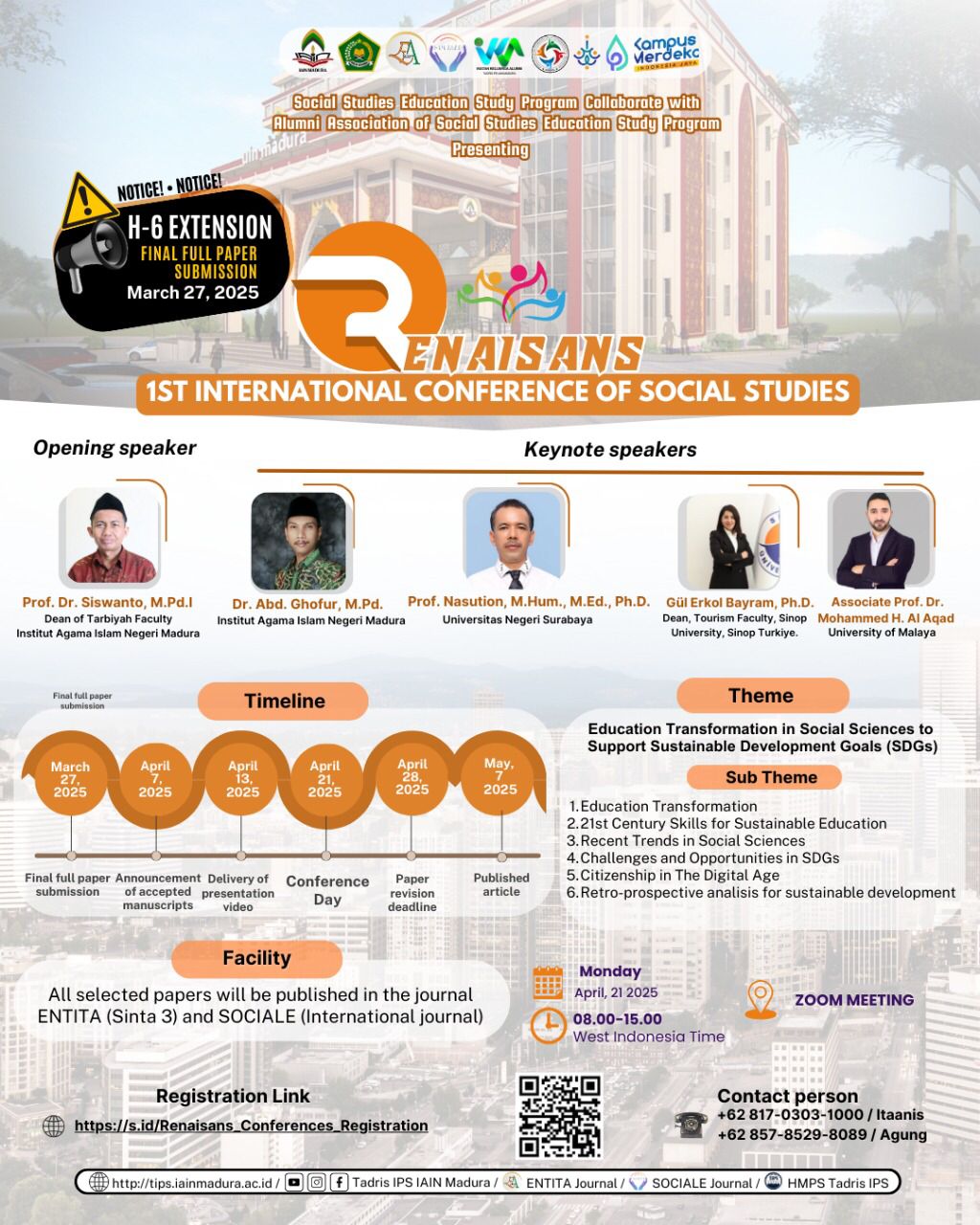Peran Gaya Kepemimpinan dan Komunikasi Perempuan dalam Mendorong Kinerja Pegawai untuk Mewujudkan Pembangunan Berkelanjutan di Kabupaten Pamekasan
 Abstract views: 193
,
Abstract views: 193
,
 PDF (Bahasa Indonesia) downloads: 206
PDF (Bahasa Indonesia) downloads: 206
Abstract
This study aims to describe the effect of communication styles and women's leadership on employee performance in educational institutions in Pamekasan Regency and see how much influence women's leadership and communication styles have on employee performance at educational institutions in Pamekasan Regency. The data sources used are primary data sources in the form of information and the results of filling out questionnaires conducted by respondents, namely employees who have female principals and secondary data sources in the form of existing data obtained through BPS, Pamekasan Education Office and Pamekasan Regional Education Office Branch, and the Ministry of Religion Pamekasan Regency. The method used is quantitative research using multiple linear regression. From the results of the analysis, it was found that there was a significant influence between leadership styles and women's communication on employee performance. This is indicated by the Sig value. 0.000 which is smaller than 0.05 and the calculated F value of 427.060. Overall, leadership style and female communication simultaneously influence employee performance with a contribution of 78.1%. This indicates that these two variables have a significant role in determining the quality of employee performance in an organization.
Downloads
References
Asadullah, M. N., & Maliki. (2018). Madrasah for girls and private school for boys? The determinants of school type choice in rural and urban Indonesia. International Journal of Educational Development, 62, 96–111. https://doi.org/10.1016/J.IJEDUDEV.2018.02.006
Astridtia, O., Tata, T., Ayu, R., Radhi, A., Tauhid, M. T., Kerja, K. K., & Perempuan,P. (2024). Social Sciences Journal ( SSJ ). 2(4), 47–60.
Birindelli, G., Iannuzzi, A. P., & Savioli, M. (2019). The impact of women leaders on environmental performance: Evidence on gender diversity in banks. Corporate Social Responsibility and Environmental Management, 26(6), 1485–1499. https://doi.org/10.1002/csr.1762
Doh, J. P. ., & Luthans, F. (2023). International management : culture, strategy, and behavior.
Eagly, A. H., & Carli, L. L. (2003). The female leadership advantage: An evaluation of the evidence. The Leadership Quarterly, 14(6), 807–834. https://doi.org/10.1016/J.LEAQUA.2003.09.004
Galbreath, J. (2019). Drivers of Green Innovations: The Impact of Export Intensity, Women Leaders, and Absorptive Capacity. Journal of Business Ethics, 158(1), 47–61. https://doi.org/10.1007/S10551-017-3715-Z/METRICS
Hwang, S., & Wu, W. (2019). Social capital and feminist power : promoting gender mainstreaming in Taiwan. International Feminist Journal of Politics, 0(0), 122. https://doi.org/10.1080/14616742.2019.1606724
Intan Baiduri, Nabilatul Hasanah, Fadjar Maulana, & Mochammad Isa Anshori. (2023). Gender dan Kepemimpinan : Sebuah Kajian Literatur. Jurnal Ilmu Manajemen, Ekonomi dan Kewirausahaan, 3(2), 179–204. https://doi.org/10.55606/jimek.v3i2.1782
Kent, M., & Noviaty Kresna Darmasetiawan. (2023). Kepemimpinan Transformasional Generasi Milenial Dalam Menghadapi Kesenjangan Lintas Generasi Di Perusahaan Blue Ekonomi Jawa Timur. JMBI UNSRAT (Jurnal Ilmiah Manajemen Bisnis dan Inovasi Universitas Sam Ratulangi)., 10(3), 2431–2444. https://doi.org/10.35794/jmbi.v10i3.52366
Masaong, A. K., Arifin, & Dewi Purnama Hamid. (2023). The Role of Transformational Leadership on School Achievement. Jurnal Pedagogi dan Pembelajaran, 6(2), 263–273. https://doi.org/10.23887/jp2.v6i2.53823
Mila, S. (2017). Perempuan, Tubuhnya dan Narasi Perkosaan dalam Ideologi Patriarki. Indonesian Journal of Theology, 4(1), 78–99. https://doi.org/10.46567/ijt.v4i1.48
Miller, V. D. ., & Poole, M. S. (2024). Organizational communication theory and research. 641. https://www.oreilly.com/library/view/organizational-communication-theory/9783110718607/
Nasir, A., Nurjana, Shah, K., Sirodj, R. A., & Afgani, M. W. (2023). Pendekatan Fenomenologi Dalam Penelitian Kualitatif 1. INNOVATIVE: Journal Of Social Science Research, 3(5), 4445–4451. https://j-innovative.org/index.php/Innovative%0APendekatan
Navlia, R. (2020). Pergeseran Peran Gender di Pondok Pesantren Al-Amien Putri 1 dan Tahfidz Al-Ifadah Sumenep-Madura. Disertasi, 1–236.
Siahaan, T., Terminanto, A. A., Haryanti, E., Harini, H., & Hikmah, D. (2024). Peran Kepemimpinan Perempuan dalam Meningkatkan Keberagaman dan Inklusivitas di Perusahaan Asuransi. 4(5), 1–12.
Simamora, I. Y., Zahra, M., Sinaga, W. A., Pandiangan, H. E., & Hasibuan, S. F. (2024). Peran Komunikasi dalam Pembangunan Pendidikan. Jurnal Pendidikan Tambusai, Volume 8, 8.
Ulummudin, N. I., Akbar Mawlana, Audea Septiana, & Martinus Legowo. (2022). Membongkar Budaya Patriarki Madura: Studi Fenomenologi Pasar Tradisional di Desa Labang sebagai Ruang Publik Perempuan Madura. Jurnal Ilmiah Penalaran dan Penelitian Mahasiswa, 6(2), 142–158.
Ward, A. (2020). I Am a Leader. NavPress.
Yang, Y., Chawla, N. V, & Uzzi, B. (2019). A network’s gender composition and communication pattern predict women’s leadership success. Proceedings of the National Academy of Sciences, 116(6), 2033–2038.
Yukl;, G. (2014). EBOOK : Leadership In Organizations, 8th Edition.
Copyright (c) 2025 Entita: Jurnal Pendidikan Ilmu Pengetahuan Sosial dan Ilmu-Ilmu Sosial

This work is licensed under a Creative Commons Attribution-NonCommercial 4.0 International License.
ENTITA: Jurnal Pendidikan Ilmu Pengetahuan Sosial dan Ilmu-Ilmu Sosial operates an Open Access policy under a Creative Commons Non-Commercial 4.0 International license. Authors who publish with this journal agree to the following terms:
- The copyright of the received article once accepted for publication shall be assigned to the journal as the publisher with licensed under a

- Journal is able to enter into separate, additional contractual arrangements for the non-exclusive distribution of the journal's published version of the work (e.g., post it to an institutional repository or publish it in a book), with an acknowledgement of its initial publication in this journal.
- Journal is permitted and encouraged to post their work online (e.g., in institutional repositories or on their website) prior to and during the submission process, as it can lead to productive exchanges, as well as earlier and greater citation of published work (see The Effect of Open Access).
- Here is Copyright Transfer Form that author can download and send to OJS during submission.

















